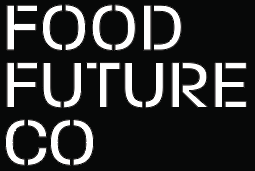Envisioning Multiple Food Futures for Impact Businesses with Sarah Smith
by
Allie Wist
Sarah Smith is a Research Director with the Institute for the Future’s Food Futures Lab, where she works with many of the world’s largest food, health, and CPG companies to challenge their assumptions and identify emerging trends and discontinuities that will transform the global marketplace and global food system.
We chatted with her about how to envision the role of impact-focused food companies in the future, and what types of values should shape our growing and eating.

Sarah Smith
Research Director
The Institute for the Future’s Food Futures Lab
What is futures thinking and what can it do for people working in the food system, especially impact-focused food companies?
First of all, futures thinking is not about predicting the future. It is about getting comfortable with exploring the widest range of possible futures. We often talk about “futures” as a plural, remembering that there is not one future to be predicted, but that there are multiple futures out there that could all be possibilities. At its core, the work [we] do is getting people to think creatively, imaginatively and strategically about future possibilities. Within food, what that means is bringing more people into the conversation of imagining how the future could be different.
Strategic foresight is not about writing sci-fi, and it’s not about creating marketing or trends analysis around like new flavors and other short-term disruptions. The point of foresight really is to be able to step back and understand, with a well-informed and broad context, what the world you’ll be living in might look like. Then you can start to identify what we call “preferred futures,” and you can start taking action to make those futures. Buckminster Fuller [said] that we are called upon to be the architects of the future, not its victims.
What is the biggest challenge in getting people to think about the future?
What we are doing at the Institute for the Future is helping people challenge some of their ideas about the ways that their industry has done things in the past, the way that things will happen going forward. A lot of it is actually helping [people] face their fears about how the world is changing. Admittedly, it is really intimidating to think about the future, when that future might put your company out of business. This problem is especially charged in the food industry, since people have such deep, emotional connections to the food and the way that it's grown. But rather than having people be reactive and fear-based, and feeling like they have no stake in what's happening, we want to give people the opportunity to understand what else is possible.
How do you engage with intimidating issues and get buy-in on the needed changes for a sustainable future?
In the process of [futures thinking], you are able to tap into people's core values. At the end of the day, there's actually much more overlap [in values] than what we disagree on. In general, farmers want to be stewards of the land; in general, eaters want food that is going to help reverse climate change; and most people understand that supporting rural America is an important thing to do. There are a lot of underlying shared values, but we get caught up in the polarities of the present. By putting ourselves 10 or 20 years out into the future, we create a more open and safe space to have these conversations [about values] and say "I actually want to be sequestering carbon into the soil," or "As a farmer, I also don't want the top soil to keep eroding." That's not to say that the future is a place where everyone agrees about everything, but [it is] a kind of safe space to start thinking differently.
What is the role of new technology for food businesses moving forward, and what are the most viable applications?
One of the founders of the Institute for the Future, Roy Amara, had a saying: we tend to overestimate the impact of technology in the short term, and underestimate it in the long term. There's often a spike of interest in specific topics: “The microbiome is the cause of all of our illnesses!” Or, “We're going to 3D print our food and revolutionize and redistribute manufacturing!” While I have no doubt about the enormous potential for new technology to change the way we grow, distribute, manufactured, and shop for food, we get too caught up in the hype of new technologies, trying to find applications for them right away. This takes away people's focus from really thinking through the longer term implications of these technologies—how they could create pretty big fundamental changes, rather than just incrementally making things more convenient for consumers.
“I think we should be looking for ways that technology is actually going to help achieve [value-based] goals, rather than creating a technological solution and then trying to find a problem to apply it to. ”
While acknowledging that there’s no “silver bullet” for the food system, what do you think will most seriously shape how we grow and consume food? Increased focus on biodiversity or issues of water scarcity, for example?
I think maybe the most important answer to this question is that there are no absolutes. It's [going to be] different in different geographies. It is inherently a large and complex system, and as soon as you change one piece of it, that ripples out and changes other parts, too. My hope would be that one of the most impactful things that could happen to “the future of food” is for people to get better at thinking across complex systems and embracing that complexity.
With that said, there are definitely still overarching forces that will almost certainly impact our food system in the next decade or more. We have been doing a lot of work around climate change, and I see that as an incredibly urgent crisis. I've been doing a lot of personal reflection on what it means to be a human living during an extinction event, and balancing that with the scope of actions that I can take as an individual. There are many different scales of action and different time frames of action. Climate action needs to happen across all of them.
Both digital technology and biotechnology in tandem [will create] new opportunities and new ways to produce food, as well as more efficient uses of resources. It [could also] eliminate some of the more cruel parts of our food system, both for human labor and animal agriculture. At the same time, the more digital technologies that are introduced, the more the battle over food and agriculture IT will escalate—there will be a whole host of new issues that come up around the ethical use of data.
What should the new priorities be for impact-focused businesses? Where do you see food businesses go wrong, and, given the complexity you mention, is it a problem for companies to focus too narrowly on one type of impact?
I think many companies are in a tough spot right now, and there is a lot expected of them in terms of sustainability. But over-emphasizing just one asset (one component of health impact or sustainability, for example) is definitely something for [food companies] to avoid. I think there is some danger in overstating the benefits of anything, partially because it's so complex to model out the real impacts of things. I've seen some really poorly-designed studies or poorly-designed models—the one that comes to mind is about cultured meat production. A study claimed that we would actually create more CO2 in the long run if we like shifted all of our beef production to lab-grown meat. The gist of it was that cultured meat is actually way more energy intensive. However, when you dig into the study methodology, you find that they used today's current energy sources and projected them out over the next 1000 years. They didn't take into consideration all of the people currently working to create renewable energy sources. It's highly unlikely that a thousand years from now, if we have a bio-reactor to create cultured meat, that it would be like running off of coal or petroleum. The point is that you have to take all these [future projections] in context. We have to always be working off of the best information we have available and remaining open to the fact that it's going to keep changing.
What role can food businesses can have in helping to change the culture around eating? Food brands have a heightened cultural presence, and could it be a place for them to get consumers asking the right questions or changing their habits?
Yes, there are ways that food businesses are changing the cultural narrative around food. Aileen Suzara, who runs a plant-forward Filipino restaurant in the bay area, spoke recently about our notion of decolonizing diets, and giving up unhealthy modern foods without losing culture. That we actually have a chance to connect back to a deeper culture. We hold stories about things like “American traditions” and we are hesitant to part with deeply rooted foodways. But we have to remember that those were all created by someone at some point, and [food culture] is almost always up for rewriting or recreation. If you're willing to step back and try something else, that can start to change that culture around food.
“I am hopeful that the food industry can serve as a kind of climate canary. ”
Why should people concerned about the future look seriously at the food system?
I am hopeful that the food industry can serve as a kind of climate canary. It is inevitably going to be at the front lines of climate change, since we so obviously rely on the planet to produce food. The food industry will have to adapt to the changing climate, and could turn food production into an opportunity to not only keep climate change from getting worse, but to actually have a positive impact on our ecosystems.


